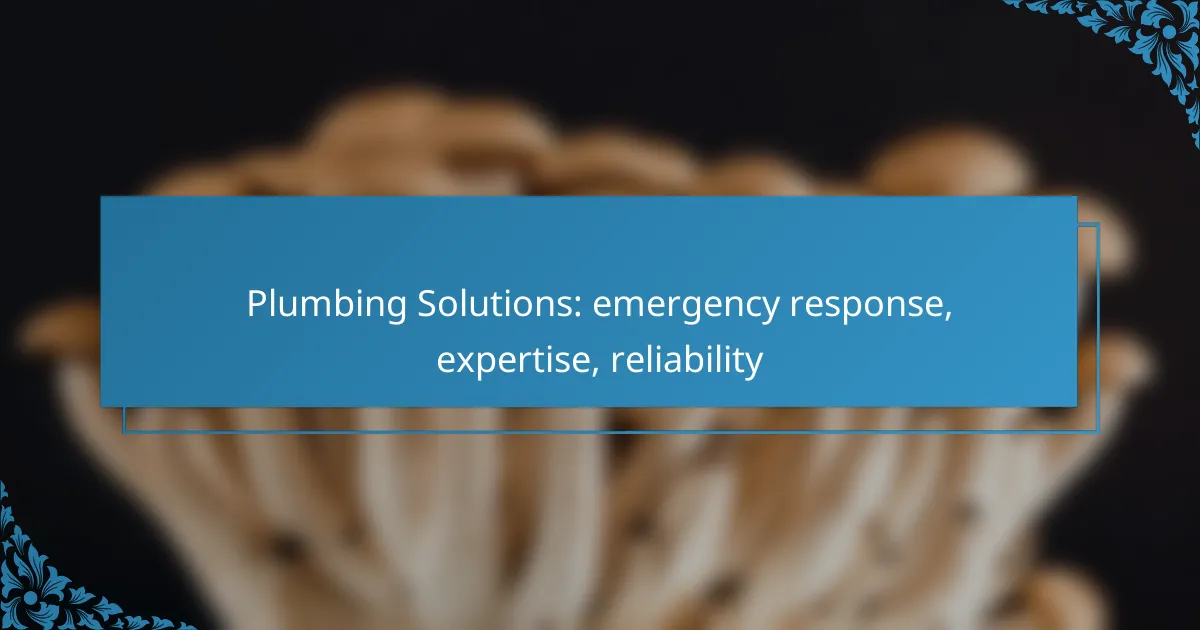In Australia, homeowners and businesses can rely on a range of plumbing solutions that address both emergency and routine needs. With rapid response times and expert technicians, these services ensure urgent plumbing issues are resolved quickly and efficiently, preventing further damage and restoring functionality. Trustworthy plumbers bring the necessary qualifications and experience to deliver high-quality service while adhering to local regulations and safety standards.

What plumbing solutions are available in Australia?
In Australia, a variety of plumbing solutions cater to both emergency and routine needs, ensuring reliable service for homeowners and businesses. These solutions include emergency plumbing services, leak detection and repair, drain cleaning, pipe installation and replacement, and hot water system repairs.
Emergency plumbing services
Emergency plumbing services are crucial for addressing urgent issues such as burst pipes, severe leaks, or overflowing toilets. These services are typically available 24/7, allowing homeowners to mitigate damage quickly.
When facing a plumbing emergency, it’s essential to contact a licensed plumber who can respond promptly. Look for professionals with good reviews and a clear understanding of local regulations to ensure quality service.
Leak detection and repair
Leak detection and repair services help identify and fix hidden leaks that can cause significant water damage and increase utility bills. Professionals use advanced technology, such as thermal imaging and acoustic sensors, to locate leaks without invasive procedures.
Regular maintenance can prevent leaks from developing. Homeowners should monitor their water bills for unusual spikes and inspect visible pipes periodically for signs of moisture or corrosion.
Drain cleaning services
Drain cleaning services are essential for maintaining clear plumbing systems and preventing clogs. Techniques such as hydro jetting or snaking can effectively remove blockages caused by grease, hair, or foreign objects.
It’s advisable to schedule routine drain cleaning at least once a year to avoid emergency situations. Homeowners can also use strainers in sinks and showers to minimize debris entering the drainage system.
Pipe installation and replacement
Pipe installation and replacement are necessary when existing pipes are damaged or outdated. Common materials include PVC, copper, and PEX, each with its advantages in terms of durability and cost.
When replacing pipes, consider the long-term implications of material choice and local building codes. Consulting with a qualified plumber can help determine the best options for your specific needs.
Hot water system repairs
Hot water system repairs address issues such as insufficient hot water, leaks, or strange noises from the unit. Regular maintenance can extend the life of hot water systems and improve efficiency.
Homeowners should be aware of the age of their hot water system and consider replacement if it is over a decade old. Additionally, checking the anode rod and flushing the tank annually can prevent common problems.
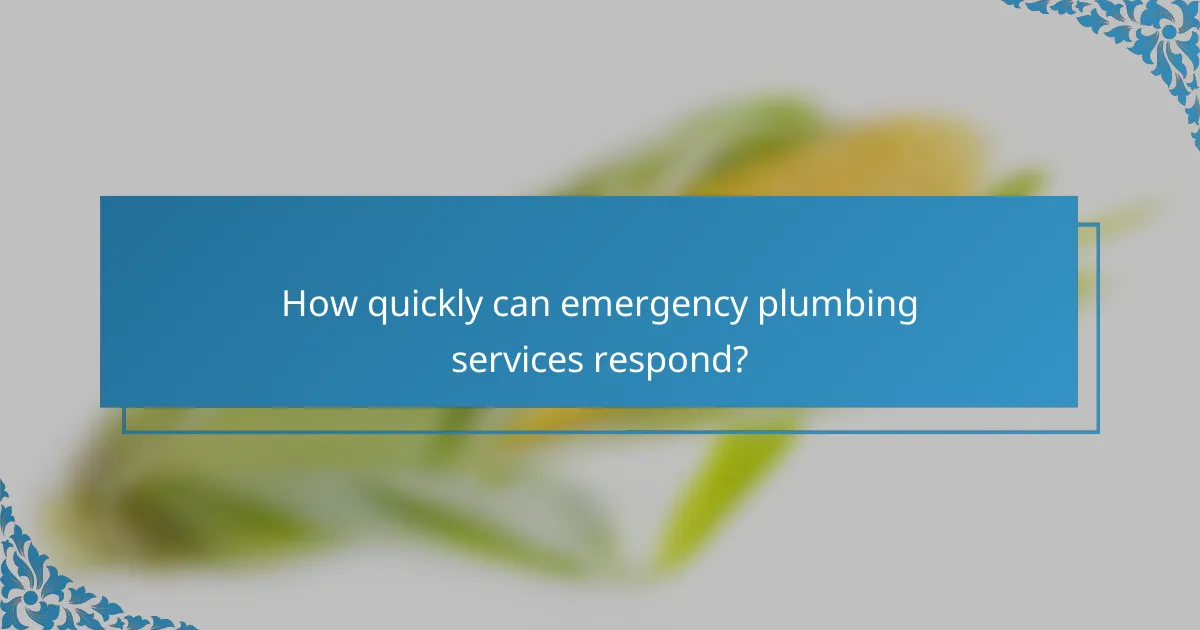
How quickly can emergency plumbing services respond?
Emergency plumbing services can typically respond within minutes, ensuring urgent issues are addressed promptly. Their rapid response is crucial for preventing further damage and restoring functionality to your plumbing system.
24/7 availability
Emergency plumbing services are available 24/7, meaning you can call for help at any time, day or night. This constant availability is essential for handling unexpected plumbing crises, such as burst pipes or severe leaks.
Many plumbing companies offer round-the-clock service, ensuring that you are never left without assistance when a plumbing emergency arises. This means you can rely on professionals to be there when you need them most.
Typical response time of 30 minutes
Most emergency plumbing services aim for a typical response time of around 30 minutes. This quick turnaround is designed to minimize damage and restore your plumbing system as swiftly as possible.
However, response times can vary based on factors such as location, time of day, and the volume of calls. In urban areas, you might experience faster service compared to rural locations, where travel times can be longer.
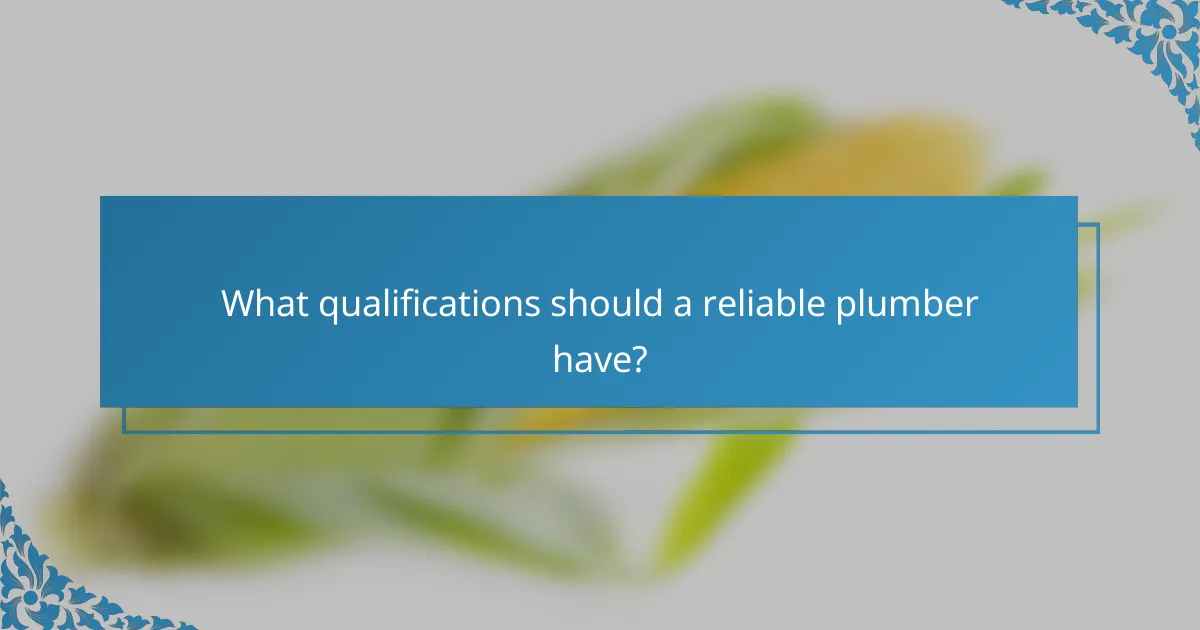
What qualifications should a reliable plumber have?
A reliable plumber should possess the necessary licenses, insurance, and experience to handle various plumbing issues effectively. These qualifications ensure that the plumber can deliver quality service while adhering to local regulations and safety standards.
Licensed and insured professionals
Licensing is crucial as it indicates that the plumber has met the required training and knowledge standards set by local authorities. Insurance protects both the plumber and the homeowner from potential liabilities during the job.
When hiring a plumber, always request proof of their license and insurance. This step not only safeguards your interests but also ensures that the plumber is qualified to perform the work safely and legally.
Experience in residential plumbing
Experience in residential plumbing is vital as it equips the plumber with practical skills to tackle common household issues, such as leaks, clogs, and installations. A seasoned plumber is more likely to diagnose problems accurately and provide effective solutions.
Look for plumbers who have several years of experience specifically in residential settings. They should be familiar with various plumbing systems and fixtures commonly found in homes, which can lead to quicker and more efficient repairs.
Positive customer reviews
Customer reviews serve as a valuable resource when assessing a plumber’s reliability and quality of service. Positive feedback from previous clients can indicate a plumber’s professionalism, punctuality, and workmanship.
Check online platforms and local directories for reviews and ratings. Aim for plumbers with consistently high ratings and testimonials that highlight their strengths, such as responsiveness and problem-solving abilities.
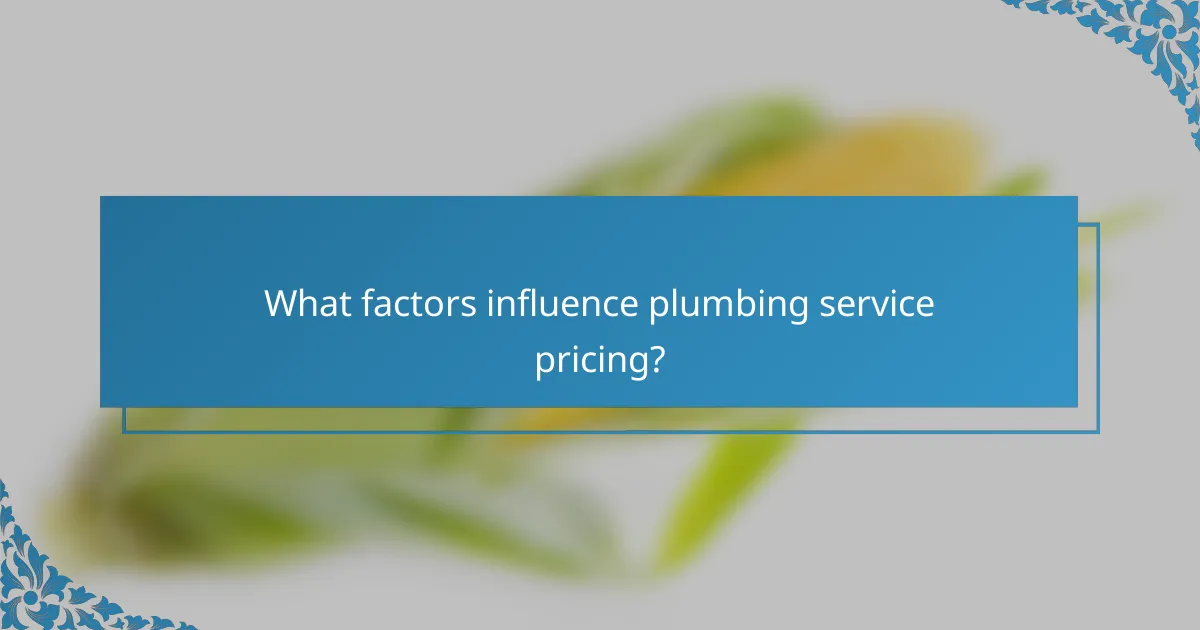
What factors influence plumbing service pricing?
Several factors significantly impact plumbing service pricing, including the type of service required, the time of day, and the complexity of the plumbing issue. Understanding these elements can help you anticipate costs and make informed decisions when seeking plumbing assistance.
Type of service required
The type of plumbing service you need plays a crucial role in determining the overall cost. Routine services like drain cleaning or faucet repairs typically cost less than emergency services such as pipe bursts or sewage backups. For example, basic repairs may range from $100 to $300, while emergency calls can escalate to $500 or more, depending on the situation.
Additionally, specialized services, such as installing new fixtures or repiping, may incur higher labor and material costs. Always request a detailed estimate that outlines the specific services included to avoid surprises.
Time of day for service
The time of day you require plumbing services can also affect pricing. Services requested during regular business hours usually cost less than those needed after hours or on weekends. For instance, a standard weekday service call might be priced at $100 to $150, while after-hours calls could increase to $200 or more.
Planning ahead and scheduling routine maintenance during off-peak hours can help you save on costs. If you encounter an emergency, be prepared for higher charges, especially if it occurs during late-night or holiday hours.
Complexity of the plumbing issue
The complexity of the plumbing issue is another significant factor influencing service pricing. Simple problems, like a clogged drain, are generally quicker and cheaper to resolve than more complicated issues, such as extensive pipe damage or major installations. The latter can require specialized tools and additional labor, driving up costs.
When assessing the complexity, consider whether the issue is straightforward or requires diagnostic work. For example, a simple leak repair might cost around $150, while a complete repiping job could range from $1,500 to $5,000, depending on the size of the home and the materials used.
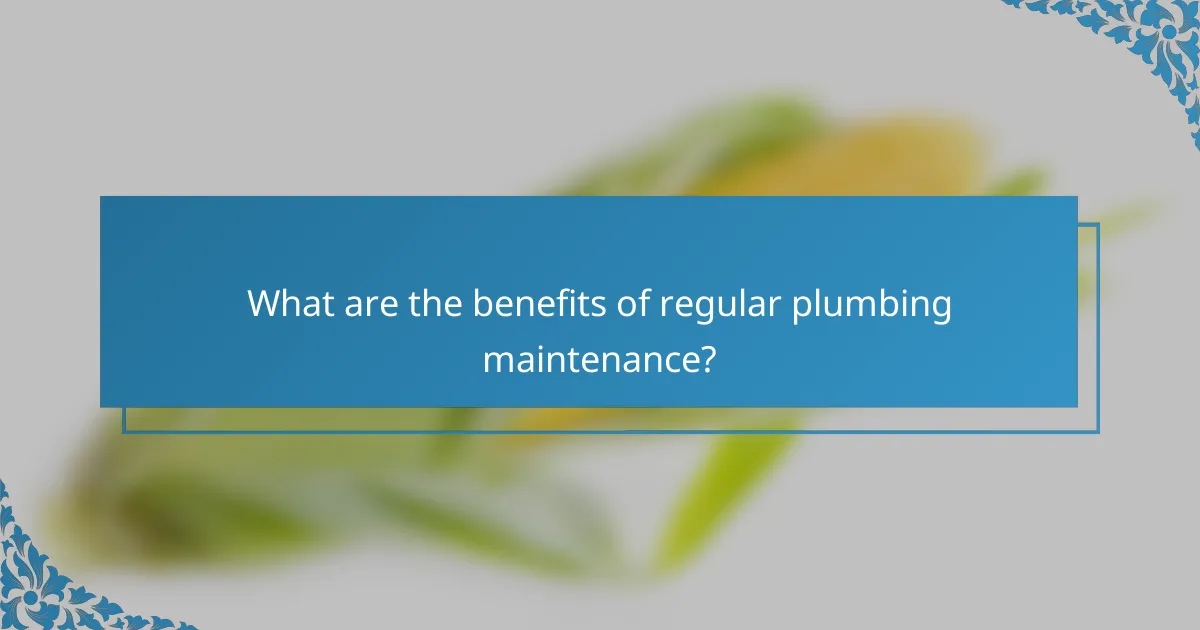
What are the benefits of regular plumbing maintenance?
Regular plumbing maintenance offers numerous advantages, including the early detection of potential issues and the extension of your plumbing system’s lifespan. By scheduling routine inspections and upkeep, homeowners can avoid costly repairs and ensure their plumbing operates efficiently.
Prevention of major plumbing issues
Preventing major plumbing issues is one of the primary benefits of regular maintenance. Routine checks can identify small leaks, corrosion, or blockages before they escalate into significant problems that require extensive repairs or replacements.
For instance, a minor leak under a sink can lead to water damage and mold growth if left unchecked. Regular maintenance allows plumbers to address these issues promptly, saving homeowners from unexpected expenses that can range from hundreds to thousands of dollars.
Additionally, homeowners should consider scheduling maintenance at least once a year. This proactive approach not only helps in identifying issues early but also ensures that plumbing systems comply with local regulations and standards, enhancing overall safety and reliability.
